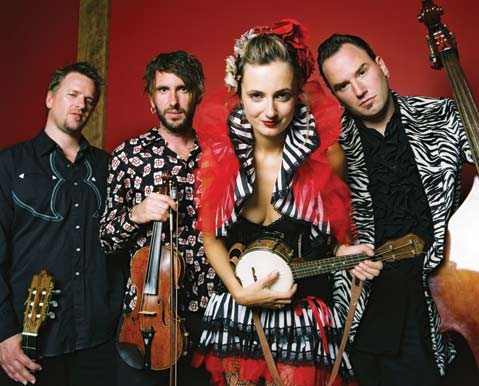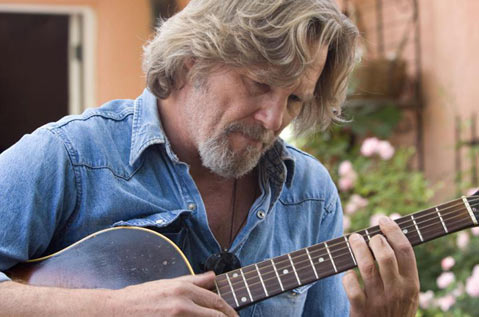Singer/Songwriters Are Everywhere
Ryan Bingham and Jeff Bridges Both Score Golden Globes

SONGS IN THE AIR, ON THE SCREEN, IN THE TOWN: Despite the multi-directional matrix of our city’s cultural offerings, even in a modestly sized “secondary market” like Santa Barbara, patterns emerge. In the dawning, yawning phase of this new year and decade, one often-heard refrain has to do with fine (and gritty) singer/songwriters on parade. Just within the last couple of weeks, we heard the power and poetic lulling of good songs well sung—sometimes in aptly rough or moody ways—when veteran Kris Kristofferson filled the Granada with his gruff wit and wisdom, and a few days later, when melancholic up-and-comer A.A. Bondy lured us into his soggy indie-rootsy eloquence at Muddy Waters. As heard in Santa Barbara, Kristofferson comes off as a grizzly, warm veteran with a young spirit, while Bondy is an enigmatic youngster in an old soul’s duds.

BRIDGES AND BINGHAM: And suddenly, the timeless but often underrated and under-rewarded world of the diehard singer/songwriter is all in the news beyond musical circles, thanks to the much-ado’d and award-magnetized film Crazy Heart, which finally found its way into area theaters last weekend. Of course, Santa Barbarans are especially beaming with borrowed pride, given that local boy Jeff Bridges has given what is possibly his finest performance yet in the role of a drink-addled cowboy singer on the rough road back to sanity. Bridges’s current musical movie presence, ironically, has circled back to Kristofferson, whom the actor (and singer, on the side) has always resembled, and never so much as in the new film (just add buckets o’ booze).
Traipsing farther on down the “six degrees of …” song trail, suddenly super-hot musician Ryan Bingham—who wrote the film’s theme song, “The Weary Kind,” and was garlanded with a Golden Globe (along with cowriter T-Bone Burnett) last week—will be appearing at the suitably semi-wild west Maverick Saloon next Wednesday. He’s the opening act in the new series of shows in that vibe-y venue courtesy the impressive Tales from the Tavern series. A salty-voiced and inspired songwriter, Bingham, a former bull-riding rodeo rider from New Mexico, has made a couple of albums for Lost Highway Records, one of America’s finest repositories of country-flavored music that matters these days. The label’s very name seems tailor-made for the American song-maker troubadour circuit.

HEAR THEM IN HELL: Meanwhile, back in “Hell,” Santa Barbara’s own gift to the culture of American (including Canadian) song—the Sings Like Hell series—continued its ongoing season of concerts at the Lobero on Saturday. This first soiree of the ’10s featured the tasty-arty pop of Austin, Texas-based Matt the Electrician and Steve Young (with the musical legend Van Dyke Parks lurking modestly in the band). More musical goodies are headed to the Lobero in the monthly series we’ve come to know, love, and count on, including the alt-country band-that-matters I See Hawks in L.A., with Ray Wylie Hubbard, on February 20, and Glen Phillips’s new-ish and wowsome ensemble project Works Progress Administration, with AJ Roach, on March 27.
TO-DOINGS: Kicking off the new set of concerts at UCSB’s MultiCultural Center this Friday, in a gypsy-esque mode, is the band Fishtank Ensemble. Stylistically, the four-piece band—with dynamic fiddler Fabrice Martinez and multilingual singer Ursula Knudson in the fold—moves freely between French, Serbian, Iberian (aka flamenco), and other global-musical points in the elastic gypsy Diaspora. You can also catch the band in town again on February 22 at SOhO.
Need a Haydn fix, in this, the long shadow of the 200th anniversary of the great composer’s death? Head over to SBMA’s auditorium on Wednesday, when that institution’s impressive chamber music series hosts an encore performance by the Szymanowski Quartet. On the program are Haydn’s “Emperor” quartet, music by Mendelssohn, and, for palatable 20th-century measure, the charmingly urbane Quartet No. 3 by French composer Simon Laks (1901-1983), circa 1945 and seemingly brimming with post-war glee.



